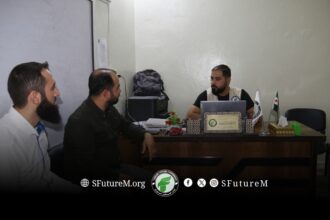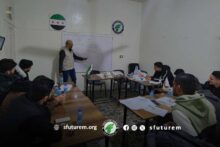The Syrian regime and the opposition, Between Stalemate and Reconciliation

Introduction:
The internal political reality of Syria is highly complex and intertwined, facing significant challenges resulting from the crisis that began with the popular uprising in 2011. This provides an essential conceptual foundation for describing the Syrian political landscape, serving as a starting point for this paper.
The Structure of Syria’s Internal Political System:
The current situation in Syria can be summarized as follows:
- Multiple Actors: Syria is home to various active parties, including the Syrian regime, three main opposition factions (Islamists represented by the Salvation Government and Hay’at Tahrir al-Sham, opposition forces with the Syrian National Army and the Interim Government, and the Autonomous Administration with the Syrian Democratic Forces), as well as regional and international powers. Each party has different interests and objectives, making it difficult to reach a political solution.
- Geographical Division: Syria is divided into areas of influence, each with its own dynamics.
- Humanitarian Crisis: The Syrian people are suffering from a severe humanitarian crisis, as the conflict has caused widespread destruction and displaced millions.
The main challenges facing Syria, based on this reality, are as follows:
- Reconstruction, which requires massive resources and new infrastructure, poses a significant challenge amid the ongoing economic crisis.
- Political Settlement: Reaching a lasting political settlement remains a major challenge, as it requires consensus among the conflicting parties and significant compromises.
- Counterterrorism: Syria faces the challenge of combating terrorist organizations that have exploited the crisis to expand their influence, whether these groups align with or oppose the Syrian regime.
- The Return of Syrian Refugees: Facilitating the return of refugees is a significant challenge, as it requires ensuring security, stability, and improved living conditions.
The Reality of External Interventions:
The external political situation in Syria is extremely complex and intertwined, influenced by various internal and external factors. Generally, the current situation can be summarized as follows:
- Multipolarity: The influential forces in the Syrian arena are diverse, including regional powers such as Iran, Turkey, and Russia, as well as Western countries like the United States and France, along with some Arab nations. Each of these powers has its own agenda and varying interests in Syria.
- Changing Alliances: The international relations concerning Syria are characterized by continuous changes, leading to the formation of new alliances and the dissolution of others. This ongoing transformation complicates efforts to find a political solution to the Syrian crisis.
- Economic Sanctions: Syria, particularly the regime, is subject to economic sanctions from many Western countries, negatively impacting its economy and ability to rebuild.
- The Refugee Issue: Like the internal description, the refugee situation is also an external matter. The presence of millions of Syrian refugees in neighboring countries and Europe poses a significant challenge and affects relations between Syria and host countries.
- Counterterrorism: Combating terrorism is another key issue influencing Syria’s foreign policy, as many countries seek to eliminate existing terrorist organizations.
Regarding the main challenges facing Syria on the external front:
- Restoration of Diplomatic Relations: Syria, along with all its components, seeks to rebuild its diplomatic relationships with Arab and Western countries, but this effort faces numerous obstacles.
- Lifting Economic Sanctions: These sanctions pose a significant barrier to Syria’s reconstruction and economic development.
- Permanent Political Solution: Achieving a lasting political solution to the Syrian crisis remains a major challenge, as it primarily requires consensus among the active international and regional parties.
Benefits of Reconciliation Between the Regime and the Opposition:
Undoubtedly, there are some potential benefits to reconciliation between the Syrian opposition and the Syrian regime, considering the significant complexities surrounding this issue. Among these benefits are:
- Ending the War and Violence: The primary goal is to halt the bloodshed and suffering that the Syrian people have endured for many years.
- Reconciliation Can Help Restore Stability: This would allow for the return of refugees and the initiation of the reconstruction process.
- Unifying Efforts to Face Common Challenges: Both parties can work together to address challenges facing Syria, such as terrorism, corruption, and economic collapse.
- Protecting National Unity: Reconciliation may help preserve the unity of the Syrian social fabric.
However, we must also recognize that there are significant challenges preventing the achievement of these goals, including:
- War Crimes: Accountability for the crimes committed during the war is a fundamental issue that must be addressed fairly.
- Eroding Trust: Rebuilding trust between the conflicting parties will be a long and arduous process.
- Regional and International Interventions: These interventions in Syrian affairs may complicate the reconciliation process.
- The Fate of the Opposing Armed Factions: This is one of the contentious issues that must be resolved.
- Achieving reconciliation in Syria: requires a strong political will from all concerned parties, along with the support of the international community. If this support is forthcoming, it could bring significant benefits to the nation and its people.
Negatives of reconciliation between the regime and the opposition:
The situation can be viewed from two perspectives: the perspective of the opposition and the perspective of the Syrian regime. Each side has its negatives that we, in the Political Office of the Syrian Future Movement (SFM), urge to be thoroughly examined and addressed.
A. Potential negatives for the Syrian opposition in the event of reconciliation with the Syrian regime:
- Erosion of principles and constants: The opposition may be forced to compromise on many of the principles they fought for, such as achieving democracy and transitional justice, in order to attain reconciliation.
- Loss of popular legitimacy: The opposition could lose a significant portion of its popular legitimacy if it is perceived as having abandoned the aspirations of the Syrian people who are revolting against Bashar al-Assad’s regime.
- Integration into the regime: Opposition elements may be integrated into the regime’s institutions, leading to a loss of their independent identity and political influence.
- Persecution and revenge: Opposition members and civilians who supported them are likely to face persecution and revenge from the regime and its security apparatus, as has occurred in Daraa after the 2018 settlement.
- Marginalization of the opposition and division into warring factions: This would weaken its negotiating position, which the regime’s security mentality is adept at exploiting.
- Affirmation of the regime’s legitimacy: Reconciliation may grant legitimacy to the regime and erase its crimes against the Syrian people.
- Loss of international support: It is also likely that rapprochement with the Syrian regime could result in the opposition losing the international support it previously enjoyed.
- Difficulty in achieving transitional justice: Achieving transitional justice and holding perpetrators of crimes accountable is likely to be challenging under a reconciliation system.
In addition to these negatives, there are also concerns that the reconciliation might merely be a political deal aimed at preserving the interests of international and regional parties, without addressing the needs of the Syrian people. The reconciliation may not guarantee long-term stability, and the crisis could resurface if its root causes are not addressed. These are just some of the potential negatives; the situation in Syria is complex and constantly changing, and new, unexpected negatives and challenges may arise alongside it.
B. Regarding the potential negatives for the Syrian regime in the event of reconciliation with the opposition:
- Loss of Russian and Iranian support: A rapprochement with the opposition could lead to a decline in the military and financial support provided by Russia and Iran to the regime, both of which are essential pillars for its survival in power.
- Internal pressures facing the Syrian regime: From its military and security leaders, who may oppose any settlements with the opposition for fear of losing their influence and interests.
- Potential accusations against Syrian regime leaders for war crimes and crimes against humanity: This could lead to the imposition of new international sanctions or even international legal prosecution.
- Difficulty in achieving genuine, comprehensive, and deep reconciliation between the Syrian regime and the opposition: Due to the depth of the disagreements between the two parties and the grave violations committed during the years of conflict.
- Continued violence: The situation in Syria may witness ongoing violence even after a reconciliation agreement is reached, due to the presence of extremist groups that do not wish to settle or the regime’s inability to impose full control over all areas.
- Difficulty in reconstruction: Due to the immense destruction inflicted on the infrastructure and the displacement of millions of Syrians, in addition to the crippling economic crisis faced by the regime.
However, it should be noted that the nature of the negatives that the Syrian regime may face depends on the terms of reconciliation and the guarantees that will be provided to the opposition. Additionally, there are many other factors that influence this complex issue, such as the positions of regional and international countries and the future of extremist organizations in Syria.
Gains of the Opposition from Not Reconciling with the Syrian Regime:
It is essential, after this narrative, to study the reality of the absence of reconciliation with Bashar al-Assad at the head of the ruling regime, the persistence of the repressive and security mentality, and the continued embrace of the Syrian regime by the Iran axis (resistance and defiance). Studying the reality of rejecting reconciliation and its gains is an important factor in weighing the options for reconciliation or its absence.
Despite the significant challenges facing the Syrian opposition, refraining from reconciliation with the Syrian regime may yield some gains for them, including:
- Maintaining Moral Legitimacy: The opposition retains its moral legitimacy and the values it fought for, such as freedom and democracy, which can enhance its position on the international stage during any future regional or international turning point.
- Pressuring the Syrian Regime: By organizing protests and peaceful resistance in its territories, and expanding the scope of such actions similar to the Sweida movement, the opposition could compel the regime to make concessions or change its policies.
- Preserving Hope for the Syrian People: Despite its fragmentation and weakness, the opposition remains a symbol of hope for the Syrian people in achieving a better future, making it capable of rallying support around its political project.
- Gaining International Support: The opposition can benefit from both material and political support from countries backing them, enabling them to continue their activities.
- Avoiding Past Mistakes: By learning from previous errors (e.g., the situation in Daraa), strengthening its organizational structures, and developing its political vision, the opposition can become better equipped to face future challenges.
However, the opposition must also recognize that the lack of reconciliation carries significant risks, including:
- Continued Conflict: This may lead to further human and material losses, destruction of infrastructure, and displacement of more civilians.
- Internal Disagreements and External Interventions: These factors can divide the ranks of the opposition and increase its vulnerability.
- Loss of Popular Support: The opposition may lose part of its popular support if it fails to achieve tangible results on the ground.
- Erosion of Grassroots Support: Continued warfare can erode the opposition’s grassroots base, especially in areas controlled by Syrian regime forces.
Conclusion:
The decision to reconcile or not is a difficult and complex one, requiring the opposition to conduct a careful assessment of the potential gains and losses, which we have attempted to highlight in this paper. It also necessitates the development of a clear strategy to address future challenges.
There are differing opinions on the pros and cons of reconciliation, and this evaluation represents the perspective of our team in the Political Office of the Syrian Future Movement (SFM). We invite thinkers and opinion leaders to provide supporting insights for either this reconciliatory stance or the opposition to it.
Ultimately, the success of any option depends on several factors, including the position of the Syrian regime, international support, and the internal unity of the opposition.
Political Office
Research Team
Research and Studies Department
Articles
Syrian Future Movement (SFM)






